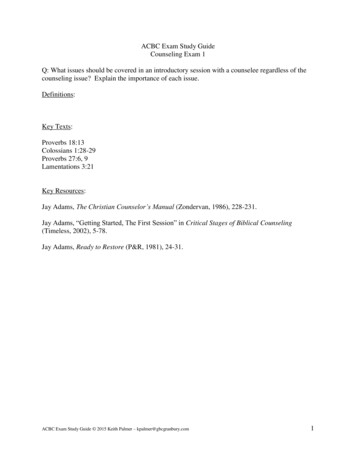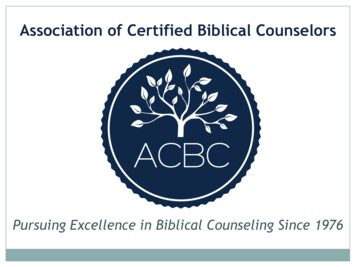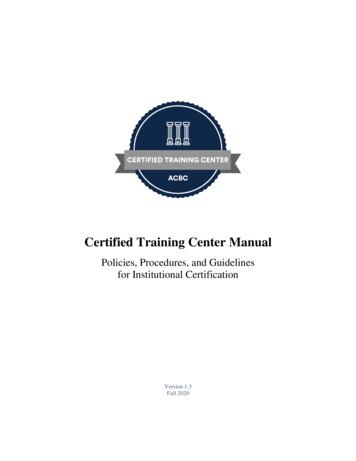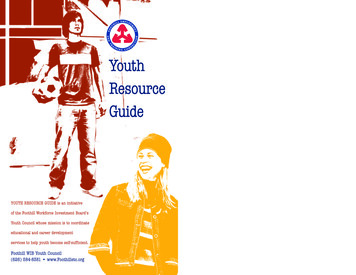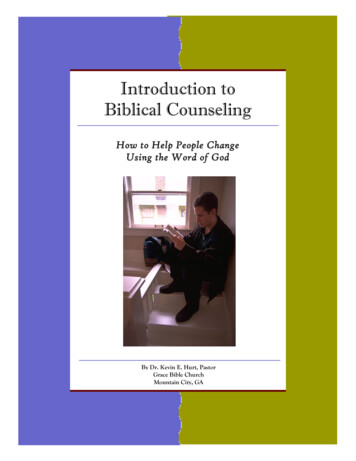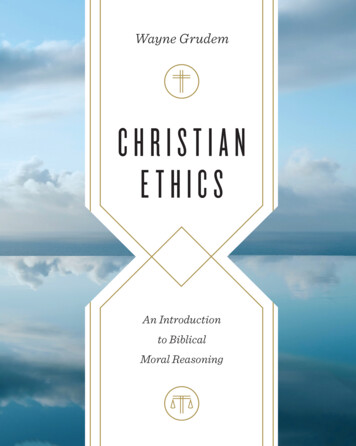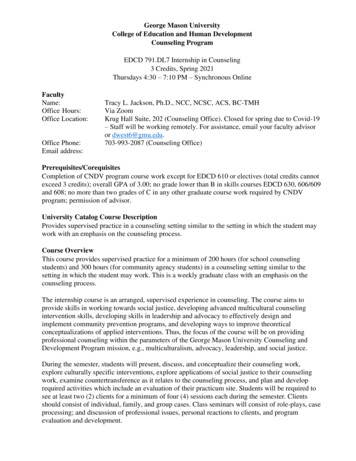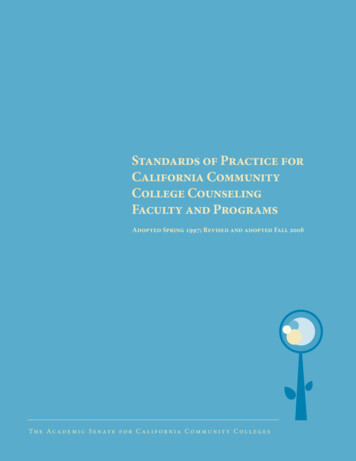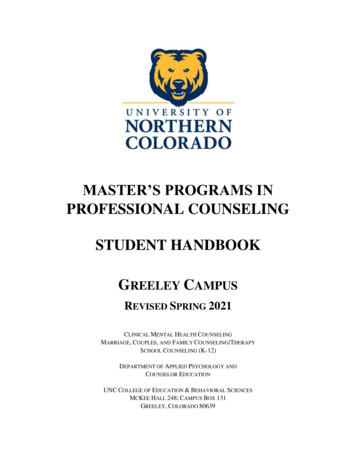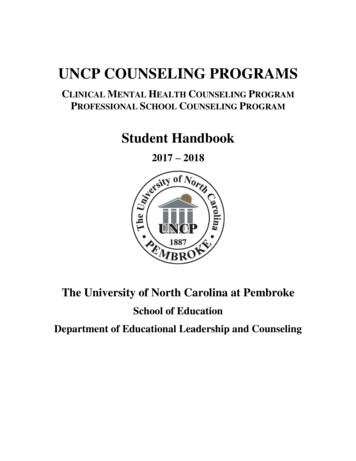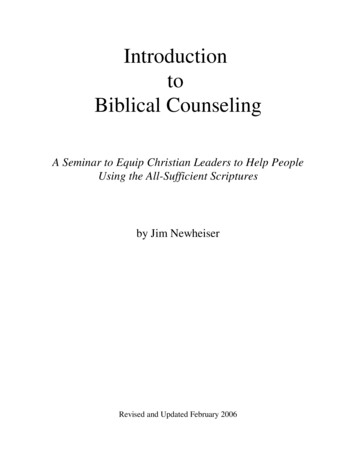
Transcription
IntroductiontoBiblical CounselingA Seminar to Equip Christian Leaders to Help PeopleUsing the All-Sufficient Scripturesby Jim NewheiserRevised and Updated February 2006
Table of ContentsPart I : Foundations of Biblical CounselingPsychology and Christian Counseling . . . . . . . . . . . . . . . . . . . . . . . . . . . . . . . . . . . . . . . 1General Principles of Biblical Counseling . . . . . . . . . . . . . . . . . . . . . . . . . . . . . . . . . . . . 5Theology and Biblical Counseling . . . . . . . . . . . . . . . . . . . . . . . . . . . . . . . . . . . . . . . . 11The Doctrine of Sanctification and Biblical Counseling . . . . . . . . . . . . . . . . . . . . . . . . 13Counseling in a Postmodern World . . . . . . . . . . . . . . . . . . . . . . . . . . . . . . . . . . . . . . . 15The Tenderness Trap . . . . . . . . . . . . . . . . . . . . . . . . . . . . . . . . . . . . . . . . . . . . . . . . . 19Part II: Common Counseling IssuesPeacemaking . . . . . . . . . . . . . . . . . . . . . . . . . . . . . . . . . . . . . . . . . . . . . . . . . . . . . . . . 27Who is a Murderer? . . . . . . . . . . . . . . . . . . . . . . . . . . . . . . . . . . . . . . . . . . . . . . . . . . 29Conflict Resolution and Communication . . . . . . . . . . . . . . . . . . . . . . . . . . . . . . . . . . . . 31Church Discipline . . . . . . . . . . . . . . . . . . . . . . . . . . . . . . . . . . . . . . . . . . . . . . . . . . . . . 35Learning from King David’s Mid Life Failure . . . . . . . . . . . . . . . . . . . . . . . . . . . . . . . . 41Temptation . . . . . . . . . . . . . . . . . . . . . . . . . . . . . . . . . . . . . . . . . . . . . . . . . . . . . . . . . 49Confess Your Sins . . . . . . . . . . . . . . . . . . . . . . . . . . . . . . . . . . . . . . . . . . . . . . . . . . . . 51Rejoice in God's Forgiveness . . . . . . . . . . . . . . . . . . . . . . . . . . . . . . . . . . . . . . . . . . . . 53Forgiving Others . . . . . . . . . . . . . . . . . . . . . . . . . . . . . . . . . . . . . . . . . . . . . . . . . . . . . 55In Whom Do You Trust? . . . . . . . . . . . . . . . . . . . . . . . . . . . . . . . . . . . . . . . . . . . . . . 57Obedience to God . . . . . . . . . . . . . . . . . . . . . . . . . . . . . . . . . . . . . . . . . . . . . . . . . . . . 59Integrity . . . . . . . . . . . . . . . . . . . . . . . . . . . . . . . . . . . . . . . . . . . . . . . . . . . . . . . . . . . . 61Worry . . . . . . . . . . . . . . . . . . . . . . . . . . . . . . . . . . . . . . . . . . . . . . . . . . . . . . . . . . . . . 63Financial Freedom . . . . . . . . . . . . . . . . . . . . . . . . . . . . . . . . . . . . . . . . . . . . . . . . . . . . 65The Disease of Materialism . . . . . . . . . . . . . . . . . . . . . . . . . . . . . . . . . . . . . . . . . . . . . 69Dealing with Abuse . . . . . . . . . . . . . . . . . . . . . . . . . . . . . . . . . . . . . . . . . . . . . . . . . . . 71The Pain of Porn . . . . . . . . . . . . . . . . . . . . . . . . . . . . . . . . . . . . . . . . . . . . . . . . . . . . . 75Substance Abuse . . . . . . . . . . . . . . . . . . . . . . . . . . . . . . . . . . . . . . . . . . . . . . . . . . . . . 77Peer Pressure: Not Just for Teens . . . . . . . . . . . . . . . . . . . . . . . . . . . . . . . . . . . . . . . . . 79Knowing God’s Will: Part 1 . . . . . . . . . . . . . . . . . . . . . . . . . . . . . . . . . . . . . . . . . . . . . 83Knowing God’s Will: Part 2 . . . . . . . . . . . . . . . . . . . . . . . . . . . . . . . . . . . . . . . . . . . . 87Serve God in Your Vocation. . . . . . . . . . . . . . . . . . . . . . . . . . . . . . . . . . . . . . . . . . . . 89A Change of Clothes and a Change of Mind. Ephesians 4:17-24 . . . . . . . . . . . . . . . . . 91Turn Natural Vices into Supernatural Virtues. Ephesians 4:25-30 . . . . . . . . . . . . . . . . 93Walk in Love. Eph. 4:29-5:2 . . . . . . . . . . . . . . . . . . . . . . . . . . . . . . . . . . . . . . . . . . . . 95When Good Kids Make Bad Choices . . . . . . . . . . . . . . . . . . . . . . . . . . . . . . . . . . . . . . 97Helping Families with Twixters . . . . . . . . . . . . . . . . . . . . . . . . . . . . . . . . . . . . . . . . . 101Abortion and the Philosophy Behind It . . . . . . . . . . . . . . . . . . . . . . . . . . . . . . . . . . . . 103A Matter of Life and Death . . . . . . . . . . . . . . . . . . . . . . . . . . . . . . . . . . . . . . . . . . . . 107
Table of Contents (continued)Part III: Counseling Helps for the Biblical CounselorSome of My Favorite Counseling Resources . . . . . . . . . . . . . . . . . . . . . . . . . . . . . . .(Approximately) 100 “Go to” Texts for Biblical Counseling . . . . . . . . . . . . . . . . . . . .Homework Assignments . . . . . . . . . . . . . . . . . . . . . . . . . . . . . . . . . . . . . . . . . . . . . .The Use of Cassette Tapes in Counseling . . . . . . . . . . . . . . . . . . . . . . . . . . . . . . . . . .Consent to Counseling . . . . . . . . . . . . . . . . . . . . . . . . . . . . . . . . . . . . . . . . . . . . . . . .Personal Data Inventory . . . . . . . . . . . . . . . . . . . . . . . . . . . . . . . . . . . . . . . . . . . . . . .Counseling Observation Class . . . . . . . . . . . . . . . . . . . . . . . . . . . . . . . . . . . . . . . . . .Observer’s Organizer . . . . . . . . . . . . . . . . . . . . . . . . . . . . . . . . . . . . . . . . . . . . . . . . .Counseling Role Play Class . . . . . . . . . . . . . . . . . . . . . . . . . . . . . . . . . . . . . . . . . . . .Counselor’s Notes . . . . . . . . . . . . . . . . . . . . . . . . . . . . . . . . . . . . . . . . . . . . . . . . . . .NANC Counselor’s Exam . . . . . . . . . . . . . . . . . . . . . . . . . . . . . . . . . . . . . . . . . . . . .NANC Theological Exam . . . . . . . . . . . . . . . . . . . . . . . . . . . . . . . . . . . . . . . . . . . . .NANC Personal Evaluation Form . . . . . . . . . . . . . . . . . . . . . . . . . . . . . . . . . . . . . . . .NANC Case Report Form . . . . . . . . . . . . . . . . . . . . . . . . . . . . . . . . . . . . . . . . . . . . .111113117119121123127129131133135137139141Part IV: Homework AssignmentsFamily Conflict Assignment . . . . . . . . . . . . . . . . . . . . . . . . . . . . . . . . . . . . . . . . . . . .Teach us to number our days . . . . . . . . . . . . . . . . . . . . . . . . . . . . . . . . . . . . . . . . . . .Family Budget . . . . . . . . . . . . . . . . . . . . . . . . . . . . . . . . . . . . . . . . . . . . . . . . . . . . . .Unfaithfulness Assignment . . . . . . . . . . . . . . . . . . . . . . . . . . . . . . . . . . . . . . . . . . . . .Child-Centered or God-Centered Home . . . . . . . . . . . . . . . . . . . . . . . . . . . . . . . . . .Ways Parents Provoke their Children . . . . . . . . . . . . . . . . . . . . . . . . . . . . . . . . . . . .Seven Steps of Parenting . . . . . . . . . . . . . . . . . . . . . . . . . . . . . . . . . . . . . . . . . . . . . .Child Rearing . . . . . . . . . . . . . . . . . . . . . . . . . . . . . . . . . . . . . . . . . . . . . . . . . . . . . . .Some Suggested Steps When Spanking . . . . . . . . . . . . . . . . . . . . . . . . . . . . . . . . . . .Manipulation Test . . . . . . . . . . . . . . . . . . . . . . . . . . . . . . . . . . . . . . . . . . . . . . . . . . .50 Questions to Ask Your Wife . . . . . . . . . . . . . . . . . . . . . . . . . . . . . . . . . . . . . . . . .Are You a Fool? . . . . . . . . . . . . . . . . . . . . . . . . . . . . . . . . . . . . . . . . . . . . . . . . . . . .How Do I Rate as an Encourager . . . . . . . . . . . . . . . . . . . . . . . . . . . . . . . . . . . . . . . .Do I Have a Servant’s Heart? . . . . . . . . . . . . . . . . . . . . . . . . . . . . . . . . . . . . . . . . . . .Anger Journal . . . . . . . . . . . . . . . . . . . . . . . . . . . . . . . . . . . . . . . . . . . . . . . . . . . . . .Journal of Upsets . . . . . . . . . . . . . . . . . . . . . . . . . . . . . . . . . . . . . . . . . . . . . . . . . . . art V: QuizzesIntroduction to Biblical Counseling: Quiz 1Introduction to Biblical Counseling: Quiz 2Introduction to Biblical Counseling: Quiz 3Introduction to Biblical Counseling: Quiz 4Introduction to Biblical Counseling: Quiz 5179181183185187.
Part I : Foundations of Biblical Counseling
Psychology and Christian CounselingI.Introduction and review.A. A breakdown in society - the religion of secular humanism.B. The failure of the Church.C. The emergence of the Biblical Counseling Movement.1. Jay Adams: 1970s Competent to Counsel.II.Harmful errors of modern psychology.A. Is psychology a science in the same way that medicine is?1. Should the pastor deal with the spiritual problems while the “mental healthprofessional” deals with the emotional and mental problems?2. Psychology and theology both deal with the same fundamental issues of meaning andvalue from widely differing perspectives.B. Unscriptural presuppositions and practices of certain schools of psychology.1. A faulty view of man.a. Man is only an advanced animal: naturalism/materialism. Gen. 1:26-27b. Man is basically good, or at worst a blank slate. Rom. 3:10-18, 23 Ps. 51:5c. Man is autonomous: able to solve his own problems without God’s help.John 15:5 II Tim. 3:22. Excuses sin and denies personal responsibility.a. Blame shifting: parents, teachers, society, etc. I John 1:8-10 Js. 1:13-15 Ps. 32.3fb. The medical model: calling sin sickness (“mental illness”).c. Is there such a thing as “mental illness”?1
3. No fixed moral values: relativism. II Tim. 3:16-17a. Non-directive counseling (Rogers). Pr. 14:12 Col. 1:28 Js. 5:19-20b. Sinful behaviors and desires legitimized.c. Promotion of “socially acceptable” gratification of carnal appetites (ventilation).d. Often attempts to relieve God given guilt by destroying conscience.4. No place for God.C. Secular psychology is powerless to bring about meaningful change. Jer. 17:9 Rom. 8:5-8D. What about those cases in which people seem to get better?1. Often symptoms (i.e. bizarre behavior) go away with or without treatment.2. The most serious (spiritual) problems remain. Luke 11:24-26III.Christian approaches to counseling.A. Radical separation: the pastor and psychologist are professionals working in differentrealms.1. Pastors refer cases dealing with emotional problems to qualified counselors.2. Psychology and biblical Christianity address the same human problems from verydifferent viewpoints.3. Who is qualified to counsel? Gal. 6:1 Rom. 15:142
B. Integration: psychologists who happen to be Christians are best suited to helping peoplewith their problems.1. These people tend to use their psychological training as a starting place, withScripture being applied to support the psychological ideas. Mk. 12:31 II Tim. 3:22. They tend to accept psychological findings uncritically while neglecting sound, indepth Bible teaching.3. The danger of integration. II Cor. 6:14-18C. Synergism/spoiling the Egyptians: since “all truth is God’s truth”, Christians should addthe best of psychology to what the Bible teaches.1. They claim to use Scripture to critically examine the findings of psychology.2. They have the same problems as the integrationists.3. Their system is unusually built around an extra-biblical concept.4. That which was taken (spoiled) from the Egyptians was silver, gold, and garments, notideas and beliefs. Col. 2:3, 8-10 Lev. 18:3f I Cor. 3:19D. Biblical counseling: the Bible is the sole and sufficient authority in counseling.II Tim. 3:16-17 II Pet. 1:3 Heb. 4:12 Ps. 19:7-141. The Bible is a fully sufficient textbook for counseling. I Cor. 10:132. The goal of Biblical Counseling is to give instruction from the Bible so the counseleecan achieve God’s goals in his/her life. I Tim. 1:5 Col. 1:27-293. Counselor qualifications are spiritual, not merely academic. Gal. 6:1-2 I Tim. 4:12, 164. Counseling is not the responsibility of an elite group of professionals, but of everymember of Christ’s Church. Rom. 15:14 Heb. 10:24-25 Js. 5:19-203
5. Ultimately counseling is God’s work. Rom. 15:13I Cor. 10:13 Ph. 4:13 Is. 9:6 11:1fa. It is only in Christ that people have hope.b. The Holy Spirit is the ultimate counselor. John 14:16-17 Gal. 5:16-25IV.Other critical concerns.A. Is there any value to secular psychology?1. Isn’t all truth God’s truth? Yes, and all error is the devil’s error.2. Relying upon secular psychology is a denial of the sufficiency of Scripture.3. Is there any case in which outside help is needed?4. Why might it be useful for Christians to know something of psychology?B. How should unbelievers be counseled?1. A non-Christian is incapable of seeking after God’s goals or doing God’s will.Rom. 8:7-8 Gal 5:18 Heb. 11:62. Unbelievers require pre-counseling: evangelism.C. Does Biblical Counseling ever fail? Luke 18:18-25 Gen. 4:6ffV.Conclusion: you are competent to counsel: biblically.Jay Adams, Competent to Counsel. The Christian Counselor’s Manual, Ready to Restore.4
General Principles of Biblical CounselingI.Introduction and review.A. Psychology and Christian counseling.1. Harmful errors of modern psychology.2. Christian approaches to counseling.B. The Biblical (nouthetic) Counseling Movement.C. Some fundamental assumptions.1. The Bible is sufficient as our textbook for counseling.2. The goal of counseling is change in conformity with God's revealed will, notnecessarily the (selfish) desires of the counselee. Col. 1:283. Change according to God's standard can only take place by the power of the HolySpirit. Phil. 4:134. The counselor is qualified through personal holiness and a knowledge of theWord of God.II.Key elements in Biblical Counseling.A. Involvement. Gal. 6:11. Avoid "professionalism" - proud, aloof, distant, mechanical. II Cor. 2:42. Instead, be humble and brotherly - next time the roles may be reversed.Jesus felt compassion. Mark 6:34 Matt. 9:35-36 Heb. 2:14-18 4:153. Be careful not to fall into their sin!a. Why might this happen?b. What precautions should we take?5
4. Don't become an emotional crutch - make them dependant upon God, not you!5.Pray with and for your counselee.6.Hope must be built from the earliest stages of counseling. I Cor. 10:13Rom. 15:4-5,13 Phil. 1:6 II Cor. 5:17B. Investigation. Prov. 18:151. Don't jump to conclusions. Learn to ask good questions and to listen.Prov. 18:132.Where possible, hear from all parties involved. Prov. 18:173. Not all problems are caused by personal sin.a. Organic problems should be referred to physicians.b. You may need to get the client stabilized physically before you can have ameaningful session - i.e. lack of sleep, under the influence.4. One of the most important issues to determine is whether the counselee is abeliever. How should you counsel an unbeliever? ("pre-counseling")5. A tool- the Personal Data Inventory.C. Interpretation. Rom. 12:21. Distinguish between the symptoms and the causes of problems.2. Often the counselee will not know what his problem is, or he will haveincorrectly identified it.6
3. Don't rely upon hunches or human wisdom, but interpret the data based upon theWord of God. Prov. 14:12D. Instruction. II Tim. 3:16-17 Eph. 4:17-281. Don't rely upon fallible human wisdom, but upon the inerrant and powerful Word ofGod.2. You must deal firmly with sin. Eph. 4:17-22 I Thess. 5:14a. Don't minimize sin.b. Don't hesitate to rebuke sin. Acts 20:31 Gal. 2:113. Sin must be repented of - put off. I John 1:9 Ps. 32:3-5 Prov. 28:134. New life patterns must be established - put on. Eph. 4:22-28Real happiness and meaning in life can only be found in submission to God's will.5. Resources - The Christian Counselor's Manual, Helps for Counselors, (Adams)E. Intention. Luke 9:23-241. Counseling is more than instruction.2. The counselee is responsible to commit to obedience to God.3. Deal with behavior, not feelings.The counselee must agree to obey God, whether he feels like it or not.4. If a counselee refuses to commit to do God's will, you may need to end thecounseling relationship. Matt. 7:6 18:15-187
F.Implementation.1. The counselee cannot expect the counselor to change him.i.e. by telling him something new which, like a pill, makes him feel better.2. The counseling sessions are not ends in and of themselves.Action and obedience are needed. Mark 10:17-223. The greatest progress in counseling is made in between sessions.4. Concrete homework assignments should be given.a. Actions and behavior. i.e. seek forgiveness, attend church, destroycontraband, plan how to deal with a particular temptation.b. Scripture reading and memory.c. Christian books, pamphlets, and tapes. Excellent tools are available.d. Journals. i.e. record of sin patterns, study assignments.5. Resource: A Homework Manual for Biblical Counselling I & II, (Mack)G. Integration.1. The structure of the local church should be used in maintaining accountability.a. We do not want to become substitute psychologists (professionals).b. Sometimes church discipline may be required. Matt. 18:15-17c. What about confidentiality in counseling?8
2. You are not seeking merely a solution to one problem, but a total restructuring of alife over the period of time.3. New, godly habits are built over time. Eph. 4:13-14Both you and the counselee should have realistic expectations.4. The goal is that the counselee will be able to counsel himself and others. Gal. 6:6III.Conclusion.9
Theology and Biblical CounselingI.II.Introduction: Why do you need theology to counsel?Key areas of doctrine. (Answer with Scripture references)A. Epistemology.1. How can we know God’s truth?2. What place does natural revelation have in Biblical Counseling?3. Why is the Bible necessary?B.Bibliology.1. Explain the terms inspiration, authority, infallibility, inerrancy, and sufficiency.2. Is there continuing revelation?3. How does your view of Scripture affect your approach to counseling?4. How would belief in continuing revelation affect your counseling?C.Theology proper.1. Explain and state the biblical basis for the doctrine of the Trinity.2. How is each person of the Trinity involved in your counseling?3. List ten attributes of God and explain how they relate to your counseling.4. How does the truth that God is Creator and Lord impact your counseling?D.Christology.1. Who is Jesus Christ?2. How does Jesus’ endurance of temptation affect your counseling?3. What is the nature of His work on the cross?4. How can the work of Jesus be applied in counseling?E.Anthropology.1. What is man’s essential nature?2. What does it mean to be in the image of God?F.Hamartology.1. Why is mankind sinful?2. In what ways and to what extent has sin affected mankind?3. How will this affect your counseling?G. Soteriology.1. What is justification and how does the counselee’s view of justification affect counseling?2. What is your view of sanctification, and how does your view affect counseling?3. How does the doctrine of the perseverance of the saints affect your counseling?H. Pneumatology.1. Who is the Holy Spirit?2. What role does the Holy Spirit play in salvation?3. What role does the Holy Spirit play in counseling?I.Ecclesiology.1. What is the church?2. What role should the church play in the counseling process?J.Eschatology.1. How does eschatology affect counseling?2. How could faulty eschatology affect a counselee?11
The Doctrine of Sanctification and Biblical Counseling (Romans 6)I.Introduction.A. Does grace promote sin? 6:1, 15B. How does grace make you holy?II.First, you must be in Christ.A. Unbelievers are enslaved to sin: Not able not to sin. Rom. 6:17 8:7-8 3:10fB. God is at work in believers. Phil. 1:6III.Second, remember who you are in Christ. Rom. 6:11A. Biblical commands are based upon who you are in Christ.B. The key to holiness is understanding your union with Christ.1. You are united with Christ in His death and resurrection. Rom. 6:1-10 Col. 3:1-52. You have been freed from sin and enslaved to righteousness. Rom. 6:15-18 II Cor.5:17 Grace has emancipated you from sin’s tyranny: able not to sin.3. This does not mean that you will live in sinless perfection, but the power of sin overyou has been broken.IV.Third, act according to who you are in Christ. Rom. 6:12-13, 19b Eph, 4:22fA. Sanctification involves effort and action.B. Put off sin. Rom. 6:12-13a, 19bC. Put on righteousness. Rom. 6:13b, 19c 12:1D. Victory is assured. Rom. 6:14 Titus 2:11-14 Phil. 2:12-13V.Do you want to be holy?A. Unbiblical views of sanctification will impede your spiritual growth.1. Sanctification by mere law.2. Sudden sanctification by formula or experience.3. Passive sanctification.B. Remember who you are in Christ.C. By grace, fight your sinful flesh and use your body to serve God.13
Counseling in a Postmodern WorldI.Introduction: Why do you need to know about postmodernism? Acts 17 II Co. 10:4-5A. It is important to understand the worldview of those whom we are seeking to reach.Acts 17 Paul at Athens.B. What is post-modernism? A general and wide-ranging term which is applied to literature,art, philosophy, architecture, fiction, and cultural and literary criticism, among others.Postmodernism is largely a reaction to the assumed certainty of scientific, or objective,efforts to explain reality. In essence, it stems from a recognition that reality is not simplymirrored in human understanding of it, but rather, is constructed as the mind tries tounderstand its own particular and personal reality. For this reason, postmodernism is highlyskeptical of explanations which claim to be valid for all groups, cultures, traditions, or races,and instead focuses on the relative truths of each person. In the postmodern understanding,interpretation is everything; reality only comes into being through our interpretations ofwhat the world means to us individually. Postmodernism relies on concrete experience overabstract principles, knowing always that the outcome of one's own experience willnecessarily be fallible and relative, rather than certain and universal. Postmodernism is"post" because it denies the existence of any ultimate principles, and it lacks the optimismof there being a scientific, philosophical, or religious truth which will explain everything foreverybody - a characteristic of the so-called "modern" mind. The paradox of the postmodernposition is that, in placing all principles under the scrutiny of its skepticism, it must realizethat even its own principles are not beyond questioning. As the philosopher Richard Tarnasstates, postmodernism "cannot on its own principles ultimately justify itself any more thancan the various metaphysical overviews against which the postmodern mind has defineditself." (From the PBS website)II.Understand the times in which we live: Truth Decay. I Chron. 12:32 Rom. 13:11A. Pre-modernity. (Up to the 17th century).1. Pre-modern thought presupposed a God-centered view of reality (but not necessarilyChristian).2. Divine revelation is the final arbiter of truth and gives reality and meaning to allthings.3. Mankind is dependent on God Who makes and organizes history.4. Religion gives society uniformity.5. How would this worldview affect counseling?B. Modernism (Beginning in the 17th Century: the Enlightenment)1. Modernism is a man-centered view of reality, which looks to man to understand theworld and solve his problems through intellectual and scientific endeavors.2. Reason replaces revelation as the final arbiter of truth, thereby liberating humanityfrom religious mythology.3. Modernism is optimistic about human potential and progress.4. Modernism assumes a unified view of truth and reality, which mankind can discoverthrough reason and science: laws of nature.5. Man can express ultimate realities using language.6. Modernism stresses individualism and autonomy.7. Mankind makes his own history.8. How would modernism affect one’s view of counseling?9. Christian apologists have worked for the past 200 years to answer modernism.15
C. Postmodernism (Beginning in the mid-20th century).1. Postmodernism critiques modernity’s claim that mankind can gain objectiveknowledge through rationalism and empiricism.2. Postmodernism denies the existence of fixed absolute universal and objectivetruth. There is no meta-narrative (the big story which explains everything).3. Truth is a construct and is relative. Truth is made rather than found.4. Language cannot render truths about the world in an objective way: word games.a. There is no truth to which language corresponds.b. All meaning is socially constructed.c. Written texts do not have a single knowable meaning or truth value.d. The meaning of words and texts is determined by the reader, not the author.5. Truth claims have been used as instruments of oppression and power.6. Postmodernism exalts the community.7. Postmodernism is pluralistic. Truth has been replaced with truthS.8. Postmodernism is revolutionary: Modern society with its rationalism and unitaryview of truth needs to be replaced by a new world order.9. The arguments Christian apologists make against modernism don’t work againstpost-modernism.III.The influence of postmodernism.A. Postmodernism affects our culture in many ways.1. Postmodernism and the arts.2. Postmodernism and history.3. Postmodernism and the natural sciences.4. Postmodernism and education.5. Postmodernism and politics (including the judiciary).6. Postmodernism and the media.7. A battle is raging in our universities between modernism and postmodernism.B. Postmodernism and religion.1. Religion has been used as a means of power and control.2. Religion often fails to respect the perspectives of other communities.3. Religious texts must be deconstructed.4. Religious pluralism. The heretic is the one who dares to believe he has the truth.C. Postmodernism and morality.1. There is no absolute right and wrong for all people.2. Tolerance is the cardinal virtue.3. Collective guilt minimizes personal responsibility.4. Redefining family and gender roles.5. Sexual morality. Isa. 5:20D. The professing church has been influenced by postmodernism.1. Deconstructing the Bible.2. Pluralism and doubt in the pulpits.3. Some churches cater to the postmodern generation.16
E. The impact of postmodernism on counseling.1. Pluralism: Psychology is moving from modernism to postmodernism.2. Irrationalism.3. Relativism.4. Pessimism and Nihilism.IV.How can a Christian answer postmodernism? II Co. 10:5A. There are some useful aspects to postmodernism’s critique on modernity.1. Mankind cannot autonomously arrive at ultimate truth or create utopia. Gen. 112. Postmodernists have exposed the modernist myth of objectivity.B. Postmodernism is internally inconsistent: It collapses upon itself. Postmodernism isself-referentially incoherent. That is to say, if it is true, then it is false. If postmodernclaims are objectively true, then those claims are themselves the mere products of socialforces and so are not objectively true. If postmodernist claims are not true then theyare just the arbitrary opinions of people we are free to ignore (Craig).1. Postmodernism itself is a meta-narrative which tries to explain reality.2. Postmodernists are intolerant of those who question their meta-narrative bybelieving in some other absolute truth. Isa. 5:203. Postmodernists cannot consistently apply their system in the real world.4. Most people intuitively believe they have individual identities, live in an objectiveworld, and truth is not merely a social construction.5. Postmodernism is unable to meet the deepest human needs.C. Postmodern thought is not really new. Genesis 3 Isa. 5:20 Ecc. 1:9-101. Satan deconstructed God’s Word. Genesis 3:1,4-52. Eve chose to remake herself and to establish her own truth/reality. Genesis 3:63. The heart of sin is seeking autonomy from God.D. How can you persuade postmodern people to seek the God of the Bible?1. Deep down everyone knows God exists and that they are accountable to Him.Romans 1:19-20,32 2:14-15Acts 17:24-312. False thought, including both modernism and postmodernism is an attempt tosuppress the knowledge of God. Rom. 1:18b,21,25E. Unashamedly present a biblical view of truth: There is a personal God Who hascreated all things and has revealed Himself to us. Genesis 1:1f1. He has created us in His image for His own glory. Gen. 1:27 I Co. 8:62. God speaks with clarity and authority. II Ti. 3:16-17 Isa. 40:8 Ps. 119:142a. Language is not a human construction.b. God’s language existed before human beings. John 1:1 Gen. 1:1fc. God gave the gift of language to men. Gen. 2:19-20d. God’s Word redeems. Ro. 10:173. The Bible reveals objective truth that is knowable to humans in spite of ourlimitations as finite and fallible human beings.a. We need the Holy Spirit to understand. I Co. 2:9-16b. Meaning is not subjective. II Pe. 1:20c. We are right to be wary of how mankind uses language. Rom. 1:28fd. We are dependent upon God’s Words. Mt. 7:24,2617
4.5.6.7.V.Truth is God’s truth, revealed in Christ. John 14:6 1:14,17 Acts 4:12 I Co. 15:1fMankind seeks autonomy from God. Rom. 1:18fGod’s truth (alone) will set you free. John 8:32The gospel unites people of all cultures into one community. Eph. 2:11fRom. 7:9-10 5:9Concluding applications: What is truth? John 20:2818
The Tenderness Trap (by Jim Newheiser)(The following is a semi-fictional compilation of various experiences of Christian leaders.)It happened again. Another Pastor has fallen. This time, though, it wasn't a liberal or a glitzytelevision preacher. It was a man of sound doctrine with over twenty years of faithful ministry, aman whose godliness, giftedness, and soundness of doctrine was widely recognized. Tragically, hehas been disqualified for ministry.The sheep he served are wounded and confused. Some feel betrayed by the man who was a fatherand a brother to them. Their fait
Psychology and Christian Counseling I. Introduction and review. A. A breakdown in society - the religion of secular humanism. B. The failure of the Church. C. The emergence of the Biblical Counseling Movement. 1. Jay Adams: 1970s Competent to Counsel. II. Harmful errors of modern psychology. A. Is
